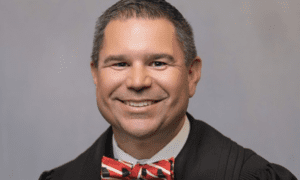Although he was found to have violated two provisions of the Fayette County government ethics ordinance, county Commission Chairman Steve Brown was partially absolved of one of the charges which spun off from seeking advice from the Georgia attorney general’s office.
The other charge, however, dealt with Brown issuing an order to the county’s HR director via email. Brown contended at the Jan. 23 hearing before the county’s ethics board that the email was actually a request, noting that had he considered it an order he would have followed up to make sure it was followed.
However, as ethics board member Scott Rowland noted, he has occasionally gotten a “request” from his boss that was actually a direct order. Ethics board member Sheila Huddleston suggested that the county’s organizational structure required Brown to take such requests to the county administrator instead.
The ethics board ruled on a 2-1 vote that Brown committed the two alleged ethics violations, but it voted 3-0 to issue no penalty for either violation. In fact, the ethics board members said Brown should have the right to consult an outside attorney on a legal matter involving the county if he questions the validity of the legal advice given by the staff attorney.
Brown said Monday that he plans to file a legal challenge to overturn the ethics board’s decision, particularly because he believes he should have the right to seek legal advice even if the matter in question came up during executive (closed) session.
Brown’s request to the HR director had to do with the protocol for handling the interview process for a new county administrator, which was being undertaken in late fall by an informal committee consisting of the three then-commissioners elect along with Brown and fellow holdover commissioner Allen McCarty, all of whom would be working together in January of this year.
Horgan contended during the Jan. 23 hearing that the county’s ethics ordinance is designed to protect employees from having influence over individual commissioners by requiring commissioners to “follow the chain of command.”
The two ethics board members who ruled that Brown had violated the ethics ordinance were Rowland and Sheila Huddleston; the third ethics board member, Larris Marks, voted against. Marks, who authored a motion to dismiss the ethics complaints that died for lack of a second, was nominated to the board by Brown as an alternate late last year. Rowland and Huddleston were nominated and approved as regular board members by Brown’s political adversaries including then-Commissioner Robert Horgan, the person who filed the ethics complaint against Brown.
In defending his actions on seeking legal advice, Brown explained in detail why he didn’t trust Bennett’s advice, which resulted in Brown penning the letter seeking specific advice from Georgia Attorney General Sam Olens. Horgan contended that letter violated the secrecy of an executive (closed) session for legal purposes. All of the ethics board members said they felt the ordinance should be rewritten to allow individual commissioners to resolve such questions.
The ethics hearing featured some fireworks between Brown and former county attorney Bennett. Early in the hearing, Brown listed a variety of reasons why he didn’t trust any of Bennett’s legal advice, which led him to seek the attorney general’s opinion on the legal matter having to do with the county’s redistricting process.
Bennett got in his shots later on during the hearing when he was called as a rebuttal character witness by Horgan. Brown’s first act in the hearing was to present local resident Bob Ross as a character witness, and Ross heaped praise on Brown for how he handled various situations and has admitted faults on several occasions.
Bennett noted that Brown has accused him on several occasions of interfering with the process of hiring a county administrator. Bennett said his only involvement came when he was speaking about the matter on the phone with Commissioner Allen McCarty, who had said the list of five finalists for the position was prepared by the county’s human resources director. Bennett said he conferenced in the HR director who said that he had gotten the list from Commissioner Brown.
Earlier in the meeting, Brown accused Bennett of withholding information about a property owner near the proposed TDK Boulevard extension between Peachtree City and unincorporated Coweta County, and also of violating his employment contract with the county in representing clients in private practice while he was employed as the staff attorney for the county.
The result, Brown said, was that he could not trust Bennett “even on most routine legal matters.”











Leave a Comment
You must be logged in to post a comment.